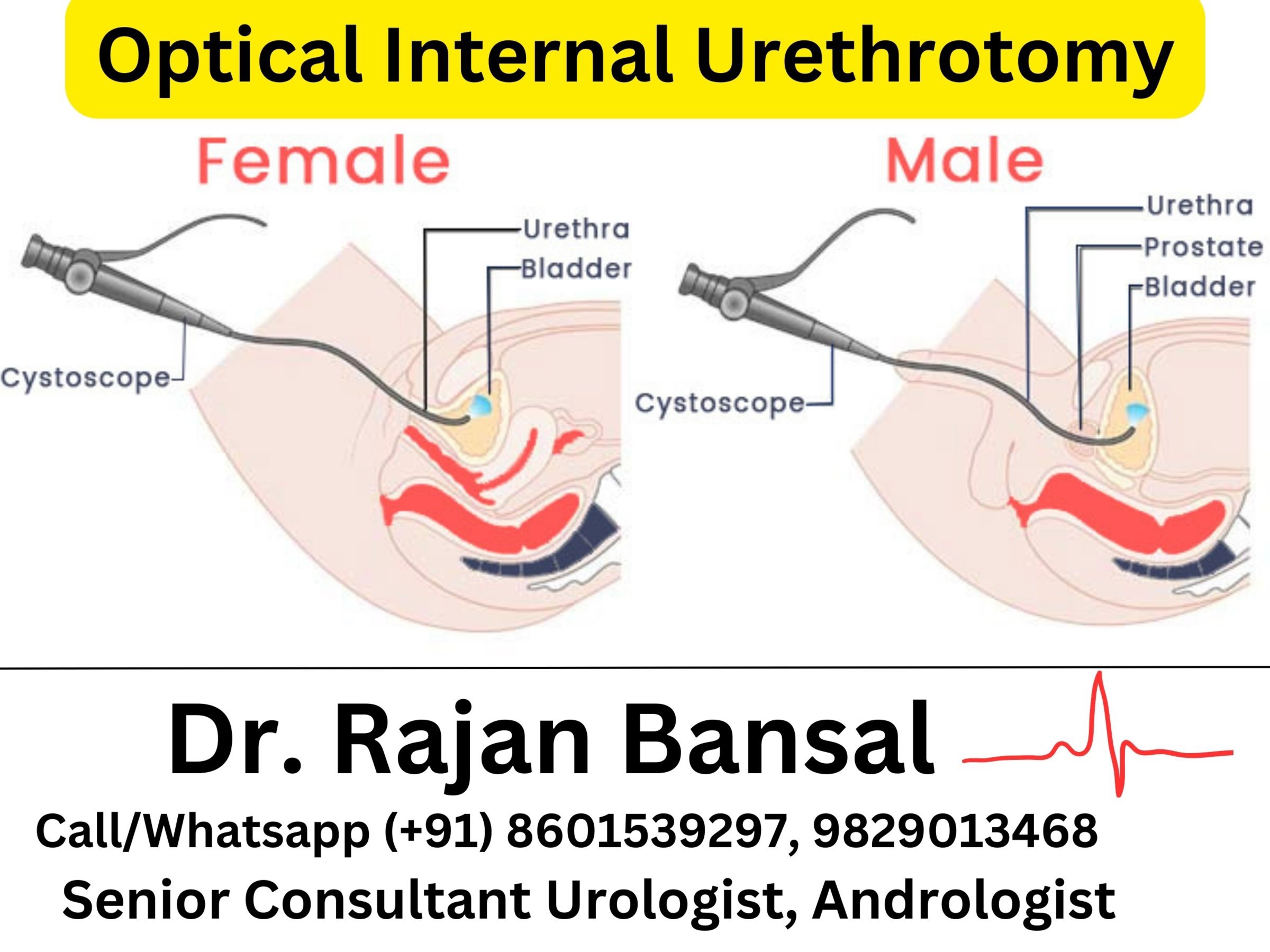Diagnosis & Treatment of Penile Cancer in Jaipur: The diagnosis of penile cancer involves a combination of medical history assessment, physical examination, and various diagnostic tests. If penile cancer is suspected based on symptoms or findings during the examination, the healthcare professional will take the following steps to confirm the diagnosis and determine the stage and extent of the disease:

Medical History and Physical Examination: The urologist will start by taking a detailed medical history, including any symptoms experienced and risk factors present. They will then perform a thorough physical examination, focusing on the penis and surrounding areas. The healthcare provider will assess any visible abnormalities, lesions, or changes in the skin, and check for any enlarged lymph nodes in the groin region.
Biopsy: A biopsy is the most definitive way to diagnose penile cancer. It involves the removal of a small sample of tissue from the affected area for laboratory analysis. There are different types of biopsies that may be performed:
a. Punch Biopsy: A small circular tool is used to remove a sample of tissue from the suspicious area.
b. Incisional Biopsy: A surgical procedure is performed to remove a part of the tumor or lesion.
c. Excisional Biopsy: The entire tumor or lesion is surgically removed for examination.
The biopsy sample is sent to a pathology laboratory where a pathologist examines it under a microscope to determine if cancerous cells are present. The biopsy also helps identify the specific type and stage of penile cancer.
Imaging Tests: Imaging tests may be performed to assess the extent of the cancer and determine if it has spread to nearby lymph nodes or other organs. These tests may include:
a. Ultrasound: This imaging technique uses sound waves to create a picture of the internal structures of the penis. It helps determine the size and location of the tumor and identify any lymph nodes that may be affected.
b. Magnetic Resonance Imaging (MRI): MRI uses magnetic fields and radio waves to produce detailed images of the penis and surrounding tissues. It can help evaluate the extent of the tumor and detect any spread to nearby structures.
c. Computed Tomography (CT) Scan: CT scan combines multiple X-ray images to create a detailed cross-sectional view of the penis and surrounding areas. It provides information about the size and location of the tumor, as well as any lymph node involvement or metastasis.
Staging and Grading: Staging determines the extent and spread of the cancer, while grading assesses the aggressiveness of the cancer cells. This information helps guide treatment decisions and prognosis. Staging is typically done based on the TNM system, which considers the tumor size (T), lymph node involvement (N), and metastasis (M).
Additional Tests: In some cases, additional tests may be ordered to assess the overall health and function of the patient, as well as to determine if the cancer has spread to other parts of the body. These tests may include blood tests, chest X-rays, or positron emission tomography (PET) scans.
Once the diagnosis is confirmed and the stage of penile cancer is determined, the healthcare provider will discuss appropriate treatment options tailored to the individual’s specific case.
It is important to consult with a qualified healthcare professional for an accurate diagnosis and personalized treatment plan based on individual circumstances.
Treatment of Penile Cancer in Jaipur
The treatment of penile cancer depends on several factors, including the stage and location of the tumor, as well as the overall health and preferences of the individual. A multidisciplinary approach involving urologists, oncologists, and other specialists is often employed to provide the most effective treatment plan. Here is a comprehensive guide outlining the various treatment options for penile cancer:
Surgery:
Surgery is a common treatment option for penile cancer and may involve the following procedures:
a. Partial Penectomy: This surgery involves removing a portion of the penis affected by cancer while preserving as much function and appearance as possible.
b. Total Penectomy: In advanced cases where the cancer has spread extensively, a total penectomy may be necessary. This procedure involves the complete removal of the penis.
c. Inguinal Lymph Node Dissection: If there is evidence of lymph node involvement, the nearby lymph nodes in the groin region may be surgically removed to prevent further spread of cancer.
Radiation Therapy:
Radiation therapy uses high-energy X-rays or other forms of radiation to kill cancer cells. It may be used as the primary treatment for early-stage penile cancer or in combination with surgery in more advanced cases. Radiation therapy can be delivered externally (external beam radiation therapy) or internally (brachytherapy), where radioactive sources are placed near the tumor.
Chemotherapy:
Chemotherapy involves the use of powerful drugs to kill cancer cells. It may be recommended for advanced penile cancer that has spread to other parts of the body. Chemotherapy can be administered orally, intravenously, or directly into the bloodstream through a port. It is often used in combination with other treatment modalities.
Targeted Therapy:
Targeted therapy utilizes drugs that specifically target certain molecules or pathways involved in the growth and spread of cancer cells. These drugs work by blocking or inhibiting the action of these molecules, leading to the destruction of cancer cells. Targeted therapy may be used in specific cases of penile cancer, such as those with advanced or recurrent disease.
Immunotherapy:
Immunotherapy aims to enhance the body’s immune system to recognize and destroy cancer cells. This treatment approach stimulates the immune response to target and attack cancer cells. Immune checkpoint inhibitors, such as pembrolizumab or nivolumab, may be used in the treatment of advanced penile cancer.
Palliative Care:
Palliative care focuses on improving the quality of life for individuals with advanced penile cancer by managing symptoms, providing pain relief, and offering emotional and psychological support. Palliative care can be provided alongside curative treatments or as the primary approach for individuals who may not be suitable for aggressive treatments.
Treatment decisions are highly individualized, and the choice of treatment will depend on several factors, including the stage of cancer, overall health, and personal preferences. It is crucial for individuals diagnosed with penile cancer to consult with a team of healthcare professionals experienced in the management of the disease to determine the most appropriate treatment plan.
Additionally, clinical trials may be available for individuals with penile cancer, providing access to promising new treatment options. Participation in clinical trials can help advance medical knowledge and potentially improve outcomes for future patients.
Regular follow-up visits will be necessary after treatment to monitor for any signs of recurrence or potential complications. These visits also provide an opportunity for ongoing support and management of any treatment-related side effects.
It is important for individuals diagnosed with penile cancer to seek support from friends, family, or support groups, to cope with the emotional and psychological aspects of the disease.
What is the Survival Rate for Patients with Penis Cancer?
The survival rate of penile cancer varies depending on several factors, including the stage at diagnosis, the extent of the disease, and the overall health of the individual. It’s important to note that survival rates are estimates based on previous data and may not reflect an individual’s specific situation. Here is a general overview of the survival rates for penile cancer:
Localized Stage (Stage I and some Stage II):
The survival rates for localized penile cancer are generally high. The 5-year survival rate, which indicates the percentage of people who are still alive 5 years after diagnosis, is estimated to be around 85% to 90%. This means that the majority of individuals diagnosed with localized penile cancer have a favorable prognosis.
Regional Stage (Advanced Stage II, Stage III):
The survival rates for regional penile cancer, where the cancer has spread to nearby lymph nodes, are lower compared to localized stage. The 5-year survival rate for regional penile cancer ranges from approximately 50% to 65%. Prompt and appropriate treatment is crucial to improve the chances of successful outcomes.
Distant Stage (Stage IV):
Distant stage penile cancer, where the cancer has spread to distant organs or structures, carries a lower prognosis. The 5-year survival rate for advanced penile cancer is estimated to be around 15% to 25%. However, it’s important to note that individual cases can vary, and new treatment approaches, such as targeted therapies and immunotherapies, may offer improved outcomes in some cases.
It’s worth mentioning that survival rates are based on historical data and treatment advancements over time may have an impact on current and future survival rates. Early detection, prompt medical intervention, and access to appropriate treatment can significantly improve the prognosis for individuals with penile cancer.
Best Hospital for Penis Cancer Diagnosis & Treatment in Jaipur – Institute of Urology, C Scheme, Jaipur
At Institute of Urology, C scheme, Jaipur we have a team of experienced and specialized urologists with expertise in penile cancer management. We offer state-of-the-art diagnostic facilities, including advanced imaging and pathology services. Additionally, we have a multidisciplinary approach, involving collaboration between different specialists (Imaging, urodynamics, laboratory etc) to provide personalized treatment plans.
For a personalised consultation or questions, you can always come and see me at the hospital or give me a call at 8601539297 (Dr. Rajan Bansal). Prior appointments can be booked on 9829013468. Booking an appointment helps us attend to you in a more prepared way with no waiting time. So, don’t wait and reach out to us today to get help. With prompt help, a better treatment outcome is always on the charts.







